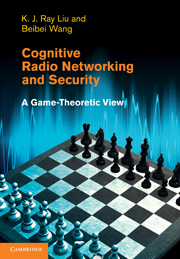Book contents
- Frontmatter
- Contents
- Preface
- Part I Cognitive radio communications and cooperation
- Part II Resource awareness and learning
- 10 Reinforcement learning for energy-aware communications
- 11 Repeated games and learning for packet forwarding
- 12 Dynamic pricing games for routing
- 13 Connectivity-aware network lifetime optimization
- 14 Connectivity-aware network maintenance and repair
- Part III Securing mechanism and strategies
- References
- Index
11 - Repeated games and learning for packet forwarding
from Part II - Resource awareness and learning
Published online by Cambridge University Press: 06 December 2010
- Frontmatter
- Contents
- Preface
- Part I Cognitive radio communications and cooperation
- Part II Resource awareness and learning
- 10 Reinforcement learning for energy-aware communications
- 11 Repeated games and learning for packet forwarding
- 12 Dynamic pricing games for routing
- 13 Connectivity-aware network lifetime optimization
- 14 Connectivity-aware network maintenance and repair
- Part III Securing mechanism and strategies
- References
- Index
Summary
In wireless ad hoc networks, autonomous nodes are reluctant to forward others' packets because of the nodes' limited energy. However, such selfishness and non-cooperation causes deterioration both of the system's efficiency and of nodes' performance. Moreover, distributed nodes with only local information might not know the cooperation point, even if they are willing to cooperate. Hence, it is crucial to design a distributed mechanism for enforcing and learning cooperation among the greedy nodes in packet forwarding. In this chapter, we consider a self-learning repeated-game framework to overcome the problem and achieve the design goal. We employ the self-transmission efficiency as the utility function of an individual autonomous node. The self-transmission efficiency is defined as the ratio of the power for self packet transmission over the total power for self packet transmission and packet forwarding. Then, we present a framework to search for good cooperation points and maintain cooperation among selfish nodes. The framework has two steps. First, an adaptive repeated-game scheme is designed to ensure cooperation among nodes for the current cooperative packet-forwarding probabilities. Second, self-learning algorithms are employed to find the better cooperation probabilities that are feasible and benefit all nodes. We then discuss three learning schemes for different information structures, namely learning with perfect observability, learning through flooding, and learning through utility prediction. Starting from non-cooperation, the above two steps are employed iteratively, so that better cooperating points can be achieved and maintained in each iteration.
- Type
- Chapter
- Information
- Cognitive Radio Networking and SecurityA Game-Theoretic View, pp. 270 - 296Publisher: Cambridge University PressPrint publication year: 2010
- 1
- Cited by



